How Midwestern was Harry S Truman? So Midwestern that the S in his name was just an S, in honor of relatives whose names began with that letter on both sides of the family. No use in getting one side or the other all riled up. Harry S was born on a farm and went to high school in Independence, Missouri. He skipped college, instead working a variety of grunt jobs. Most of his history, he learned from reading on his own, picking up whatever books happened to be around or in the local library.
He was so Midwestern, he was always neatly and carefully dressed.
After entering politics through some minor Missouri posts, being Roosevelt's vice president was a social education for him, and this too was Midwestern. As was his shock and fear when Roosevelt suddenly died. He suspected, like a good Midwesterner, that he wasn't up to the job. "Have you ever had a bull or a load of hay fall on you?" he asked reporters. Likely they hadn't. But that's how he felt when he got the news. "I don't know if you newspapermen ever pray," he told them. "But if you do, please pray for me." His Midwesternism wouldn't let this gloom prevail though. As he wrote his mother, "Maybe it will come out all right."
He was so Midwestern that when, shortly after taking office, he was told about the existence of the atomic bomb, he reckoned he oughtn't get in its way. Bigger men than him had okayed it; smarter men than him had built it. He would do what was expected of him and use it.
He was so Midwestern that he combined his announcement of Germany's surrender with a reminder that the coming Sunday was Mother's Day. We Midwesterners call mom on Mother's Day. His own Midwestern mother, age 93, visited Washington for Mother's Day in 1945. It was her first trip by plane. She wore a dress and a black coat with a corsage, and a wide-brimmed hat with a flower on it. Told that photographers were awaiting her, she reportedly said "Oh fiddlesticks! If I'd known that I wouldn't have come."
How Midwestern was Harry S Truman? Midwestern enough to be terrified of the presidency, but at the same time to joke with his wife Bess that he'd soon get things sorted enough that "there'll be no more to this job than there was to running Jackson County." When he went to meet Stalin and Churchill at Potsdam, he called it a "chore." He told Stalin he was "no diplomat" but he usually made a decision, yea or nay, once he'd heard folks speak their piece. Sometimes he seemed to be mapping Europe onto the American plains, as when he kept raising the issue of control of the inland waterways. He made no progress there, but he could use his Midwesternism as a weapon, as when he invited Stalin to stay for an impromptu lunch and Stalin demurred.
"You could if you wanted to," Harry said, and Uncle Joe had to stay. It wasn't unlike what Bess told Harry when he went home for Christmas, 1945. He had become president, accepted Germany's surrender, dropped two atom bombs and accepted Japan's.
"So you've finally arrived," Bess said. "I guess you couldn't think of any more reasons to stay away."
He was so Midwestern that he couldn't help but be disappointed in a daughter who moved to New York to pursue a career in music. "I'd rather have grandchildren in the family than a prima donna," he groused. Margaret never moved back to Missouri, even after giving up singing. Once we Midwestern women escape from a world that hates prima donnas, that frowns upon women who get "too big for their britches," it's hard for us to go back.
How Midwestern was Harry S Truman? Midwestern enough to resent the intellectuals that Roosevelt had brought to Washington, the "striped pants boys" and "tea hounds" with big words and policy papers. But this was sheer cussedness, because Truman also knew enough to stand back and let his subordinates, striped pants or no, do their jobs. And he let them take credit. When General George Marshall came up with a sweeping plan to rebuild Europe as a defense against communism, it went to a Republican Congress with Marshall's name on it. "Anything going up there bearing my name," Truman said, "will quiver a couple of times, turn belly up and die." He let Marshall own it and enact it. One of his administration's signal achievements happened with very little input from him.
Harry Truman was so Midwestern that when his mother died, he was crushed, but still found time to call in the Washington press corps and thank them for being kind about his grief. He was so Missourian that he had little experience with black folks, and so much a product of his time that he didn't much like them, but his inborn sense of fairness rejected segregation. He chose Missouri's Turnip Day to sign executive orders desegregating the military and the federal work force, even though it lost him the Southern wing of his party. Enraged, the Dixiecrats nominated South Carolina governor and racist peckerwood Strom Thurmond for president on a platform of segregation.
Harry Truman was so Midwestern that he actually loved the mistaken "Dewey Defeats Truman" headlines that were printed when he won his second term. He gave his second-term plan for the nation--which included nationalized health insurance--the Midwestern name of "Fair Deal." He described NATO as a sort of homeowners association, a group of neighbors committing to look out for one another. Had he done the same for healthcare, we might all have Trumancare today.
He was a tight knot of contradictions, on the one hand an affectionate man who loved the "little man:" the farmer, the infantryman, the old-timer scratching by on chicken feed; on the other hand a darn cussed man full of resentments and long-term grudges against insiders, Ivy Leaguers, and clever columnists, all the "sons of bitches" who looked down on him.
Was Harry Truman Midwestern enough to remain Midwestern? Despite his suspicion of the striped pants boys, he let their overarching theories about a Manichean struggle to the death between communism and democracy shape his doctrine and his actions. He let it lead him into an ill-advised, ill-defined war in Korea that quickly became a quagmire. He saw the war from the start with Midwestern eyes, describing it as a situation like that of Europe in 1917, where people were in trouble and "some friends went over and helped them." As if Korea's cows had gotten out of the paddock, as if its barn was on fire. Then he called it a "police action," as if North Korea just needed a sheriff to talk it out of beating its wife.
He wanted to visit with General MacArthur face to face, and when MacArthur refused to meet him in Hawaii, Truman flew 14,000 miles to meet him on Wake Island, where he was Midwestern enough not to notice when the General, insubordinate to the core, didn't salute him. Harry was both humble and egotistical, believing everything MacArthur told him and thinking the pointless meeting had gone well. Later he realized his mistake, and when MacArthur kept pushing to expand the war, potentially drawing in the Soviets, Truman relieved him from duty. The General returned and grandstanded in front of Congress, which Harry called, in Midwestern style, "a bunch of damn bullshit."
He was Midwestern enough to see that Joseph McCarthy, with his fake news and conspiracy theories about communists lurking everywhere, was a menace to the nation, but not to see that the loyalty oath that he himself put in place for federal employees was cut from the same cloth. In this, too, he was led astray by the striped pants boys. Had he let his Midwestern faith in people prevail, he might have avoided being the president who presided over the Red Scare, and who launched two wars, a hot war in a place where we didn't belong, and a Cold War that spread to the whole world.
Perhaps I'm being unfair to the striped pants boys. And perhaps that unfairness just comes from cussedness. But those sons of bitches bequeathed us the Cold War, and the nuclear arms race, and worst of all, a paranoid, bellicose form of nationalism that has dragged us into more wars and poisons our political discourse to this day. Like the one bad apple that rots the bushel, it has spread outward, turning positive convictions like duty, self-respect, and allegiance into uglier passions like superiority, arrogance, and blind loyalty, turning national pride into something so unthinking and aggressive, it has poisoned patriotism itself.
With the Korean War still underway, Harry Truman left office an unpopular president, so down in the polls he decided against even running for a third term. His reputation, however, began to improve quickly, especially once the war ended in 1953. Today, presidential historians tend to rank him, with downright Midwestern reserve, as "near-great."

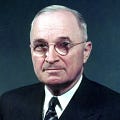
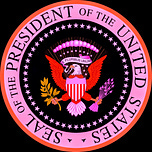



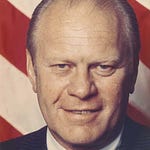
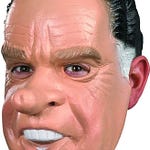

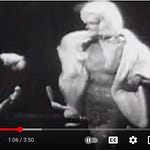
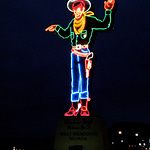
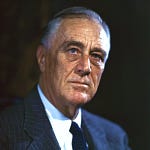
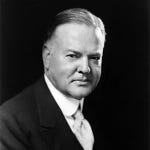
33: Harry S Truman